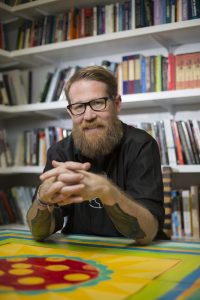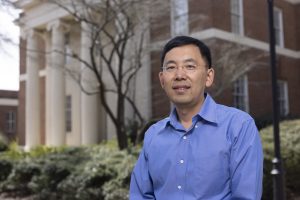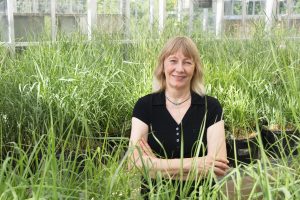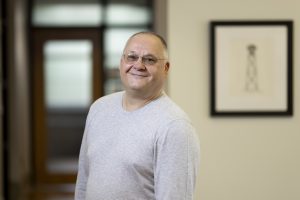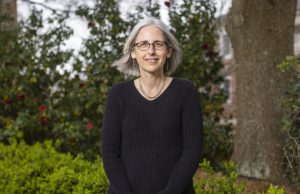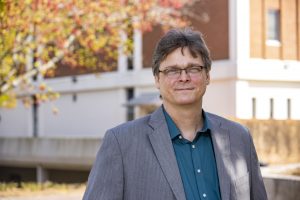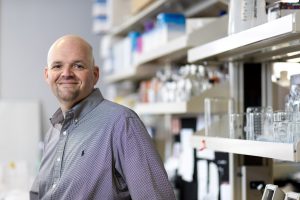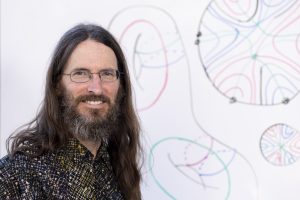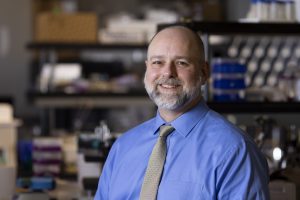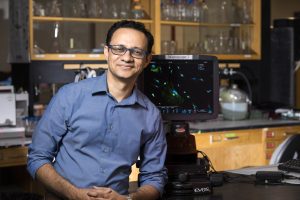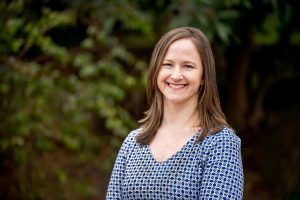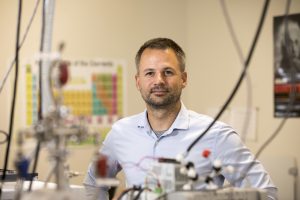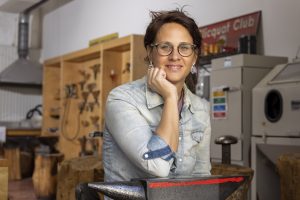Distinguished Research Professors
The title of Distinguished Research Professor recognizes senior faculty members who are internationally recognized for their innovative body of work and its transformational impact on the field. The Professorship is awarded to individuals working at the very top of their discipline, who are recognized as preeminent leaders in their fields of study.
• The work of Nik Heynen, professor in the Department of Geography, is centered in the scholarship of social and environmental justice and has helped forge closer connections between the academy and society. He is interested in how the social constructs of race, class and gender have intersected to produce uneven geographical development. He studies how social movement institutions organize across space to identify and secure adequate resources for communities. Heynen currently serves as the co-director of UGA’s Cornelia Walker Bailey Program on Land and Agriculture. He is a steering committee member of the NSF “Housing Justice in Unequal Cities” research network, bringing together research communities to study evictions, homelessness, displacement, segregation and informal housing settlements. He is also an advisory board member for a new partnership, funded by the Mellon Foundation, between UGA’s Willson Center for Humanities and Arts and the Penn Center National Historic Landmark District.
• Ping Ma, professor in the Department of Statistics, is a world leader in developing statistics, machine learning and data science tools to address modern scientific problems. With rapid advances in technology, the volume of information that scientists can collect has increased dramatically, but these giant datasets often require powerful supercomputers for effective analysis. In a true breakthrough, Ma developed algorithms that enable scientists who lack supercomputing access to analyze big data using personal computers and even iPads and smartphones. He is a pioneer in introducing so-called “nonparametric” theory and methods to “let data decide the optimal model automatically.” Ma has collaborated productively with scientists from a variety of fields, allowing them to draw valid conclusions and predictions from experimental and observational data, including those of seismic data based on dynamics of the Earth, streaming data from the Internet of Things, and epigenetic modifications unique to every individual.
• Debra Mohnen, Georgia Athletic Association Professor in Complex Carbohydrate Research and professor in the Department of Biochemistry and Molecular Biology, has made internationally recognized contributions to the field of plant cell-wall glycobiology with significant impacts on biomass and bioenergy research. In 75 peer-reviewed publications, which have generated more than 500 citations annually since 2013, she has advanced understanding of complex carbohydrates (glycans) that form the outer layer of plant cells. Pectin is essential for plant growth and form, yet the biosynthesis of this molecule was essentially a mystery. She took a biochemical approach, establishing assays, purifying enzymes and identifying the associated genes. She also discovered novel aspects of cell-wall biosynthesis that have transformed the field, including discoveries that pectin has many more forms and roles than previously expected. Greater understanding of pectin biosynthesis in multiple crops is enabling plant modification to increase agricultural output.
• Cas Mudde, Stanley Wade Shelton UGA Foundation Professor in the Department of International Affairs, is recognized as one of the world’s leading social scientists writing on populism and far-right politics. Instead of viewing radical-right parties as fleeting or outside modern democracy, he has argued that they are part of modern democracy, even if their existence could threaten democratic ideals. He has conceived of populism as a “thin-centered ideology” that views society as split between a corrupt elite and a virtuous people, and as an illiberal but somewhat democratic response to liberal but somewhat undemocratic governance. In eight authored or co-authored books and 58 journal articles, he has influenced a new generation of scholars who apply his insights to a wide range of political phenomena. His recently co-authored book is an original, empirical study of contemporary Israeli settlers as a social movement and of their impact on Israeli politics and society.
• Andrew Zawacki, professor in the Department of English, has gained distinction as a poet, translator, editor and critic. He has published five celebrated books of poetry, numerous chapbooks and limited-edition books, critical essays in prestigious literary journals and a highly visible Poetry Foundation blog. Four of his poetry books have appeared in France in French translation, and another is forthcoming. For many years, he served as co-editor of the international journal Verse, arguably the most important poetry magazine of the last decade. He has edited and translated several volumes of contemporary French and Slovenian poetry. Awarded a National Endowment for the Arts translation fellowship, a Howard Foundation poetry fellowship and many other honors, he has secured a reputation for his wide knowledge of European history and poetic forms. He continues to innovate, including new explorations of text and image, as photography has become a significant part of his creative practice.
Creative Research Awards
These awards recognize established investigators whose overall scholarly body of work has had a major impact on the field of study and has established the investigator’s international reputation as a leader in the field. Awards are given annually in each of three discipline areas, named for three renowned UGA professors.
• Rachel Gabara, associate professor of French in the Department of Romance Languages, works at the intersection of cinema studies, African studies and French and Francophone studies. She has expanded the understanding of literature and film from Africa and Europe in rigorous scholarship grounded in extensive archival research supported by the Fulbright Scholar Program and the National Endowment for the Humanities. In a book and a number of essays on autobiographical narrative, transnational modes of nonfiction film and African cinema in a global context, Gabara has examined the complex connections between the two continents during the colonial and postcolonial eras. She is currently completing a second book, Reclaiming Realism, the first comprehensive study of documentary filmmaking in West and Central Africa. Gabara serves as film review editor for the African Studies Review and has organized and facilitated a variety of events with African filmmakers and about African cinema.
• Lawrence Sweet, Gary R. Sperduto Professor in Clinical Psychology, is an internationally recognized transdisciplinary researcher. Trained as a clinical neuropsychologist, he is a methodologist with specializations in cognitive assessment and multimodal neuroimaging. He also creatively combines knowledge from other disciplines, departments and programs to generate insights into pressing challenges in public health and clinical psychology. He has published in top journals in several areas of research, including human development, behavioral medicine, cognitive neuroscience and neuropsychology. His neuroimaging approaches, taught to his trainees, have advanced understanding of neurocognitive risk markers of depression, addiction, stroke, vascular dementia and other conditions. His research has contributed to knowledge of the human lifespan from early-life adversity to aging. He has created an outstanding record of training successful researchers, offering mentorship across disciplines and at every level of career development. His impact is reflected in new generations of scientists across numerous fields.
• M. Stephen Trent, UGA Foundation Distinguished Professor of Infectious Diseases, is a driving force and an international leader in the area of bacterial cell surfaces and cell envelope biology. His work has affected the development of novel antibiotics and the generation of vaccines, providing a broader understanding of bacterial pathogenesis for the treatment of infectious diseases. He exploits a wide range of bacterial pathogen prototypes, representing different modes of infection, to highlight unique questions in cell envelope biology and bacterial surface remodeling. He has developed a series of complementary, innovative and well-funded projects that ask leading-edge questions in pathogen biology. The impressive breadth of microorganisms under investigation by his team is matched by successful integrations of multidisciplinary approaches ranging from animal models of infection to genomics, enzymology and structural biology. As a result, his work has offered detailed mechanistic investigations, as well as important broader insights that have afforded major advances.
Creative Research Medals
The university established the Creative Research Medals in 1980 to recognize a distinct and exceptional research or creative project, performed by a mid-career faculty member, with extraordinary impact and significance to the field of study.
• Amanda J. Abraham, associate professor in the Department of Public Administration and Policy, is a top researcher in the field of addiction health services. She studies sociological dimensions of addiction treatment, ranging from organizational change to the impact of government policy on treatment accessibility and quality. She has identified crucial policy questions involving the opioid epidemic, pursued new research approaches and offered evidence-based policy recommendations that could change the epidemic’s trajectory. Her research has documented what type of insurance coverage matters most for gaining or restricting access to needed medications and services during the epidemic. Her studies also highlight where serious gaps in treatment occur for Medicare and Medicaid enrollees. She pinpoints particular geographic areas, such as the Southeast, with the largest gaps between opioid use disorder treatment need and estimated treatment capacity for Medicaid enrollees. Her research also reveals a serious shortage of OUD medication providers in Medicare and highlights implications for access to needed treatment.
• David T. Gay, professor of mathematics, has made breakthroughs in topology through the development of “trisections of 4-manifolds,” a novel way of representing and studying the topology and geometry of 4-dimensional spaces. In dimensions 3 and 4, manifolds are the models for the universe (considering space as 3-dimensional, and space-time as 4-dimensional). In recent decades, the study of manifolds has been one of the most active fields of research in mathematics, building historical interactions between mathematics and physics. In 2016, Gay, in collaboration with Robion Kirby, introduced the notion of a trisection of a 4-manifold and proved the foundational existence and uniqueness results, an effective way of constructing and studying all smooth 4-manifolds. This transformative finding led to a series of papers by Gay and others, introducing new concepts and approaching longstanding problems in new ways.
• Liza Stepanova, associate professor of piano in the Hugh Hodgson School of Music, conceived a project in 2017 to respond to anti-immigrant sentiment. After meticulous research including a newly commissioned work, Stepanova gathered works by nine living composers with immigrant backgrounds living and working in the United States. Three years later, the result was her 2020 album E. Pluribus Unum, released on Navona Records, featuring piano works by well-known and established composers plus up-and-coming young artists. As an immigrant herself, she has brought together compositions that address and reflect composers’ origins, immigrant experiences and distinct contributions to American musical life. The album has been praised and reviewed in significant national and international outlets, including all three of the top classical musical journals in the United Kingdom. In this project and others, she reveals a penetrating intellect, a deep sense of purpose, and a commitment to diversity, equity and inclusion.
• Zachary Wood, professor in the Department of Biochemistry and Molecular Biology, and his team have challenged the longstanding structure-function paradigm in biology. In a 2018 paper published in Nature, Wood and graduate student Nicholas Keul reported results of experiments on the function of unfolded parts of proteins called intrinsically disordered segments. For 50 years, biologists believed that only the folded structure of proteins was important for function, and the unfolded portions were considered “junk segments” left over from evolution. But Wood and his team discovered that the unfolded segments harness entropy to produce a force that can alter the activity of the folded portion of a protein. This finding shows that disordered segments can be functional, and since the only requirement is a lack of structure, these segments are easy to evolve. Wood and his team have inspired new research initiatives worldwide and could reshape understanding of protein structure for decades to come.
Inventor of the Year Award
John Ruter is the Allan Armitage Endowed Professor of Horticulture and director of the Trial Gardens at UGA. The research he conducts focuses on breeding and releasing herbaceous and woody ornamental cultivars and developing Camellia oleifera as a new oilseed crop for the United States. His program has developed numerous ornamental cultivars with economic impact over the last 14 years, with more than 30 being licensed to companies in Georgia, across the United States and internationally. Most notable of the licensed plants are Hibiscus and Ilex (Holly) cultivars, with useful ornamental traits for various landscape applications. Previously, Ruter was awarded the D.W. Brooks Award for Excellence in Research from the College of Agricultural and Environmental Sciences. Ruter is a Fellow of the International Plant Propagators’ Society and an award-winning author of four books and more than 500 scientific and popular publications.
Entrepreneur of the Year Award
Hitesh Handa conducts translational research focused on the development of biocompatible medical device coatings that prevent infection. He founded inNOveta Biomedical LLC to facilitate commercialization of his research discoveries, and his research has led to four issued patents and multiple pending patent applications. Handa’s novel coating technology releases nitric oxide that inhibits blood clotting and infection. In fall 2019, he was selected as one of two inaugural UGA Faculty Innovation Fellows, an accolade recognizing Handa’s passion and commitment to moving his technologies to the market. In 2020, inNOveta Biomedical was awarded more than $1 million in Small Business Technology Transfer Phase II funding from the Centers for Disease Control and Prevention and the National Institutes of Health to develop his patented technology for the prevention of catheter-associated infections.
Early Career Scholar Awards
Established by the UGA Research Foundation, these awards recognize junior faculty whose research, creative and scholarly achievements indicate a trajectory toward an exceptional, sustained research career and an imminent rise to international stature in their field of study.
• Katherine Ehrlich, assistant professor in the Department of Psychology, leverages cutting-edge biological methods to understand health consequences of problematic parenting, racial discrimination and socioeconomic disadvantage. Her research often focuses on how children’s experiences become embedded in their physical health, including their immune systems, during development. In one study, she and her colleagues examined whether early-life adversity versus current stress more strongly predicted inflammatory response to challenge over time. From children’s blood samples drawn over several years, the researchers found that adversity in early life predicted enhanced interleukin-6 production whereas current stress did not. This research could provide critical information about sensitive periods for immune system development. In another study, she reported that children’s attachments to their parents were associated with asthma management. Her more recent research explores health disparities and resilience among high-achieving African American children and youth.
• Brandon Rotavera, an assistant professor with appointments in the College of Engineering and the Department of Chemistry, conducts fundamental studies to advance scientific objectives related to sustainable transportation energy for next-generation combustion systems and climate change. His research program bridges experimental measurements with computational modeling to solve basic science questions, including how reactions of new biofuels differ from those of conventional hydrocarbons, to understand how ignition occurs and how pollutants form during combustion. He has developed unique experimental spectroscopic methods to measure important chemical species and is a rising authority in the field of chemical kinetics and combustion, particularly biofuel oxidation. His research is transforming basic understanding of the gas-phase physical chemistry of biofuels and their impacts on combustion and atmospheric chemistry. His group aims to provide fundamental science to further advance the development of engines that operate in “low-temperature combustion” mode, which provides increased efficiency and reduced pollutant emissions.
• Demi Thomloudis, assistant professor in the Lamar Dodd School of Art, is an accomplished researcher in the small, intensely competitive field of contemporary jewelry. Her investigation of the human body and its relationship to jewelry has manifested in consistently strong works of art that challenge assumptions about jewelry and its meaning, power and value. Her research, which explores jewelry’s capacity to express the interrelationship of person and place, has earned her an international reputation in the field, as well as numerous accolades and invitations to participate in prestigious exhibitions and residencies. Over the last five years, she has had four two-person exhibitions and one solo exhibition; invitations to exhibit in 20 internationally recognized group and juried exhibitions; 28 nationally recognized exhibits; and was included in dozens of books, articles, exhibition catalogs, newspapers and online media that have reviewed or reproduced images of her work.


